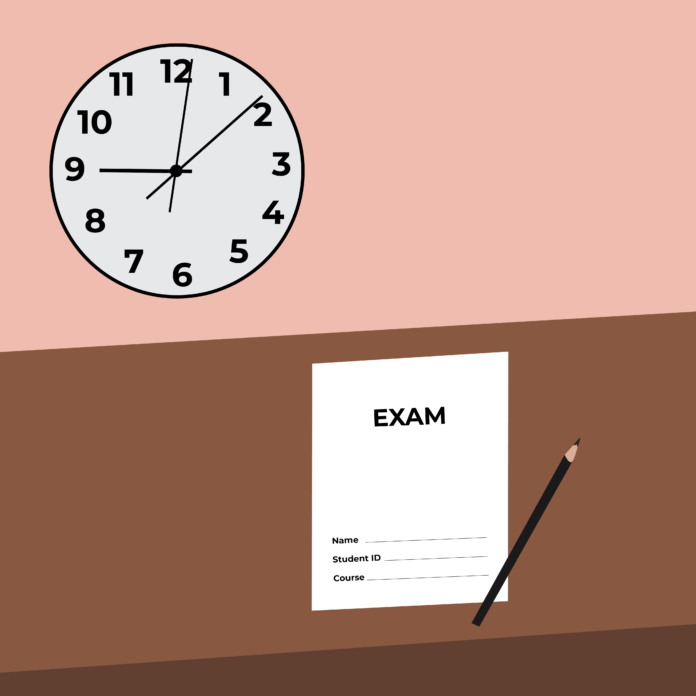On March 28, a motion to ban the use of proctoring software in undergraduate courses in the faculty of mathematics at UW was passed by the math Undergraduate Affairs Committee. If adopted by the Math Faculty Council, the ban will be officially approved.
Proctoring software is often used during online exams, tests and quizzes to monitor students with the goal of preventing academic dishonesty. However, the methods used by the software, such as tracking students’ eye movements, have been found by many to be overly invasive with very little end benefit.
The motion is the product of growing attempts by the Math Society (MathSoc) to ban proctoring software due to privacy and equity concerns alleged by Macri and other students.
Past attempts include a petition calling for the ban of proctoring software that now has over 1,000 responses. Vincent Macri, vice president, academic of MathSoc, explained the events leading up to widespread student dissatisfaction with proctoring software.
“About two years ago, when MathSoc first found out the university was looking into using the software, we immediately passed a stance to advocate against the software being used in the math faculty,” Macri explained.
“[CO342] used it for the midterm, and it was a total disaster. A lot of students reported losing a lot of time on their exam because of glitches: some students weren’t able to start their exam, some students were asked to show government ID but their Watcard wasn’t accepted as ID even though the Centre for Extended Learning (CEL) had specifically told the course instructors that it would be accepted. Their excuse was just that apparently ProctorU didn’t train their employees properly.”
“At that point, given the fact it wasn’t being used [much], we didn’t do too much other than give advice to other faculties advocating against ProctorU because a lot of students there, like those in the science faculty, felt their privacy was being invaded.”
Following the midterm, MathSoc recommended that students exercise their right to request an alternative to proctoring software. However, Macri heard from students in online sections that the software was being used again. “Instructors were required to offer an alternative [to proctoring software] to any student who requested it for any reason, because of all the problems with the software, it was decided that it wasn’t unreasonable to [allow for exemptions]. Apparently, the instructors weren’t informed of the requirement, so I had to reach out, and it became clear that CEL had reached out to these instructors without contacting faculty.”
According to Macri, faculty leadership were also unaware of the usage of proctoring software by faculty members until Macri notified them. “They weren’t too pleased because CEL did not go through [the proper processes for approving use of the software] because they ‘forgot to,’” Macri said. These processes include ensuring students understand what the software is, what it tracks, and what students’ options are.
After MathSoc’s recommendations, Macri assumed the issue had been resolved, until MathSoc continued to receive complaints regarding proctoring software.
“After midterms happened in early March, we had students reach out to us saying similar things about what had happened in Graph Theory two years ago: they were interrupted in the middle of [their exam], they lost 20 minutes trying to reconnect because if your internet connection drops even a little, you have to redo your room scans and everything which, in a timed exam, is significant [time loss],” Macri explained. “There are students who said their proctor didn’t know where to find the exam, some proctors who didn’t know the exam was on Crowdmark and spent 20 minutes trying to check LEARN, some students who got error messages and weren’t even able to write their exam.”
In response to these complaints, MathSoc officially decided to pursue banning the software. “We decided that [the current rules in place] were not sufficient, and … with the posters we’ve been putting up, an opinion piece I wrote on why proctoring software needs to be banned, it’s all to build political pressure and support for instituting a ban on the software to show the faculty that it’s not a few students who are just privacy geeks, but that there’s widespread support for this ban both within the faculty and outside of it.”
The petition’s success reflects Macri’s and MathSoc’s persistent efforts. Regarding the impact and future of the ban, Macri was optimistic. “The math faculty also worked with the engineering faculty to expand [the proctoring ban] to software engineering since that’s done jointly between the faculties. I do hope that eventually the university senate will eventually step up and implement a similar ban university-wide, but that’s something that WUSA would need to take on.”
The ban has also raised the larger question of how to more fairly assess students who may not perform as well on tests or exams as on other forms of assessment. “The issue of how we assess students is a lot more complex than whether or not proctoring software is an appropriate tool. What’s the pedagogically best way to assess students across various programs, and years? That’s a very complex thing, and that’s why the faculty is currently doing their own research into this, about what’s the best way to be assessing our students, what makes sense for the math faculty,” Macri said.
Correction: An edit was made to this story on April 6 to clarify that the motion still needed to be adopted by the Math Faculty Council before becoming official.






























